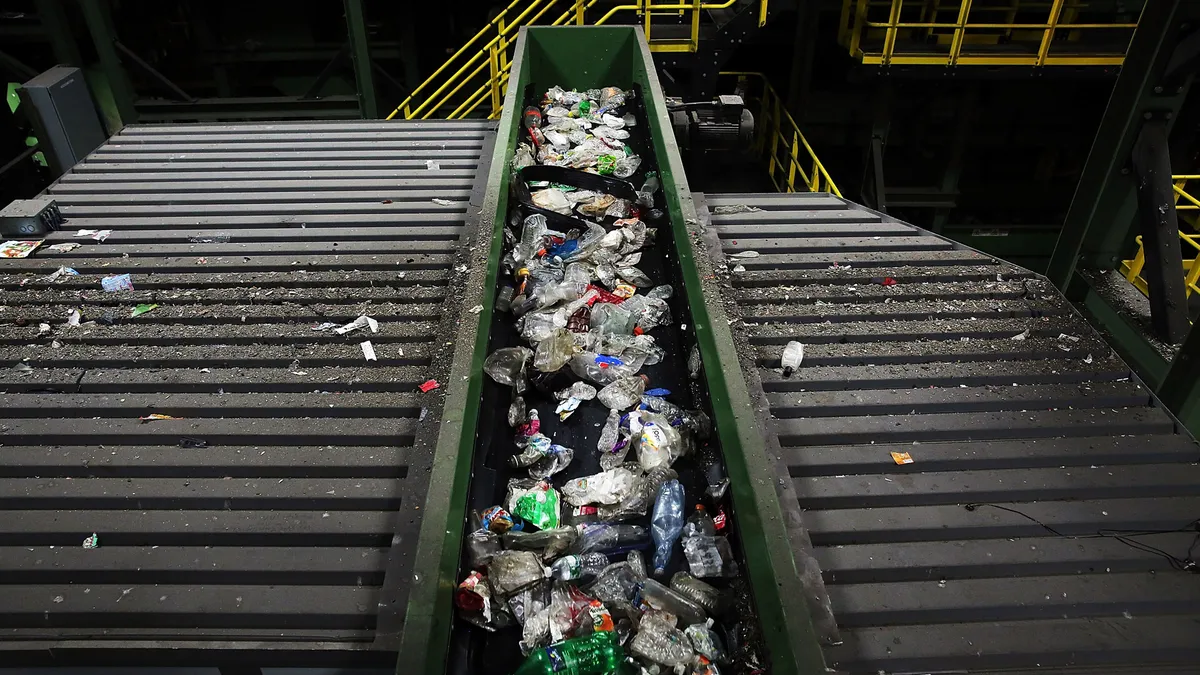Financial performance for the recycling divisions of the industry’s largest public companies has been on an upward climb for multiple quarters. Catch up on the latest statistics and commentary from second quarter earnings reports.
| Q2 Revenue* | Year-over-Year Change | |
|---|---|---|
| WM | $468M | +17.9% |
| Republic Services | $113.6M | +10.3% |
| Waste Connections | $64.68M | +60% |
| Casella Waste Systems | $81.52M | +45.7% |
*Each company may categorize their recycling revenue in slightly different ways, for example by including organics recycling activity. GFL Environmental does not report specific recycling revenues.
WM
- The company completed its sixth advanced MRF overhaul, at a site in Houston. It expects to complete two more this year and also enter a new recycling market. These automated facilities can see a 30% to 50% reduction in labor, or even higher as was the case at one in Salt Lake City, according to CEO Jim Fish.
- WM also says this can improve commodity value. “Previously, before we rebuilt the [Salt Lake] plant, they were having to sell all their mixed paper as a low-grade paper. Now they're able to separate it. And they have a pretty big component of the high-grade paper that obviously comes at a higher price,” said Fish during a recent earnings call.
- WM said average market prices for the commodities it handles were up 30% from Q2 of 2021, to a blended average of $131 per ton, due in part “e-commerce retailers and manufacturers committing to use more recycled content in their packaging,” though that trend is expected to moderate in the back half of the year.
Republic Services
- Chief Financial Officer Brian DelGhiaccio said the company’s commodity prices were $218 per ton in the second quarter, when excluding glass and organics, versus $170 per ton during the same period of last year.
- Investments in new “polymer centers” that will recycle certain plastics, the first of which is targeted to open in Las Vegas next year, remain on track. DelGhiaccio anticipates the financial benefits of that investment will started to be fully realized in 2024.
Waste Connections
- The company’s commodity values were slightly down from Q1, especially for OCC, and overall commodity prices dipped about 20% late in the quarter, CEO Worthing Jackman said.
- Jackman said the company’s two new MRFs in Illinois and Colorado are on track to open in late 2023, allowing them to process recyclables they were already collecting, thus avoiding third-party processing fees. Other automation and optical sorter upgrades are in the works for other facilities, he said. The company announced last month that it now has scheduled or built 50 robotic systems from AMP Robotics in its facilities.
- Waste Connections does not currently plan to acquire any recycling-focused companies, though Jackman said its recycling capabilities could still grow from acquiring companies that include recycling equipment or services.
GFL
- While GFL did not specifically share how recycling fit into its overall solid waste revenue category, the company did note it saw increased revenue from commodity sales during the quarter. This equated to $5.4 million in Canada and $3 million in the U.S. (Canadian dollars).
Casella
- CEO John Casella said higher recycling commodity values helped contribute to its “best quarter in company history,” with commodity prices for metals, paper and plastic hitting a nine-month high point in April. Since then, however, prices have declined by about 20%.
- Casella said it is investing $20 million in the modernization of its Boston MRF, mainly for the purchase of robotics equipment. Casella expects the new equipment to be operational in the first quarter of 2023. The company recently installed new robotics and sorting capabilities at its Ontario County recycling facility in New York.
- Equipment investments in Boston and elsewhere are meant to improve efficiency and throughput, reduce labor costs and enhance material quality. “We'll have less residue coming out of the stream, so less materials that were going to the landfill now can be recycled as well. And we'll have less labor on our line as well, which is a really big gain in this environment,” said Casella.
















